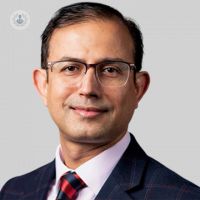Sports injury management: quick fire questions
Written in association with:Many of us engage in sports, not just for exercise but as a way of connecting with others and improving ourselves both physically and mentally. However, participating in sports can result in some injuries, which must be properly managed to prevent worsening. Renowned consultant orthopaedic surgeon Mr Muhammad Adeel Akhtar provides an overview of how to manage sports-related injuries.

Can you name some ways to manage a sports injury?
During the first 24 to 72 hours after accumulating a sports-related injury, the following pneumonic should be followed:
P - Protect
R - Rest
I - Ice
C - Compression
E - Elevation
How important is sports injury management?
It is extremely important to identify and then treat any sports injury because if left untreated, it can result in a chronic problem which is difficult to manage. In some cases, untreated problems may require major interventions, including surgery.
What are the consequences of not treating a sports-related injury?
Leaving a sports-related injury untreated can result in permanent damage to muscles, tendons, ligaments, cartilage and bone, which can result in damage to joints with persistent and debilitating symptoms.
What are the most common procedures to treat sports injuries?
Most sports injuries settle with Rest, Elevation, Ice and Compression (RICE) treatment. However, if symptoms are not improving with the above first aid treatment, careful rehabilitation is recommended to improve healing and limit any further damage.
Occasionally after talking to patients and examining the injured part of the body, it is important to arrange further tests such as an ultrasound, X-ray or MRI scan to determine the exact nature of the injuries.
These tests can also help to determine the appropriate treatment, which can be focused on rehabilitation or further support with different types of injections such as local anaesthetic, steroids, hyaluronic acid (artificial joint/tendon fluid) or special blood products like platelet-rich plasma.
Finally, surgery can be performed in order to reconstruct or repair damaged structures around the joints. Examples of these surgeries include meniscus (knee cushion) and ACL Reconstruction.
If you are suffering from a sports-related injury and would like to book a consultation with Mr Akhtar, do not hesitate to do so by visiting his Top Doctors profile today.


